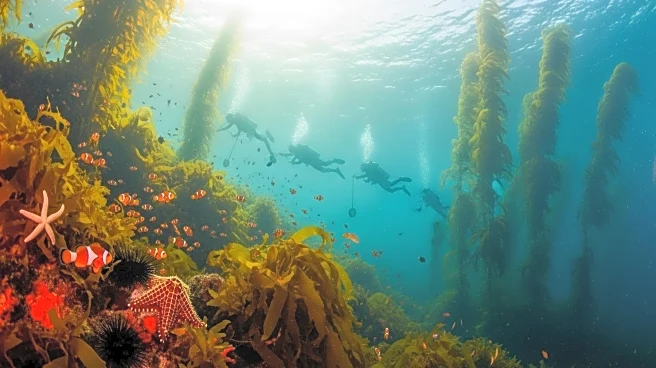What's Happening?
Divers in California have successfully restored a significant portion of the Pacific kelp forest by removing 5.6 million purple sea urchins. The kelp forest, located off the coast of Rancho Palos Verdes, had suffered an 80% decline due to warm ocean temperatures, pollution, overfishing, and the proliferation of sea urchins. The restoration project, led by the Bay Foundation, involved divers using hammers to smash the urchins, which are known to devour kelp. This effort has cleared 80.7 acres of ocean floor, allowing the kelp to regrow and thrive once again. The project is considered one of the most successful kelp restoration initiatives globally.
Why It's Important?
The restoration of the kelp forest is crucial for maintaining marine biodiversity and ecological balance. Kelp forests serve as habitats for over 800 marine species and play a significant role in carbon storage and mitigating storm wave impacts. The successful removal of urchins has not only allowed the kelp to regrow but also improved water quality and increased the abundance of marine life, including valuable red sea urchins. This project demonstrates the potential for similar restoration efforts in other parts of the world facing kelp decline, such as Tasmania and South Korea.
What's Next?
The Bay Foundation plans to continue monitoring the restored kelp forest and expand restoration efforts to other areas, such as California's Santa Barbara channel. The ongoing challenge will be to maintain the balance between urchin populations and kelp growth, especially in the face of climate change and warming ocean temperatures. The foundation's research indicates that restored sites remain mostly intact, suggesting a promising future for kelp restoration projects.
Beyond the Headlines
The restoration project highlights the resilience of kelp ecosystems and their ability to recover rapidly under favorable conditions. It also underscores the importance of collaborative efforts between scientists, divers, and local communities in environmental conservation. The project has not only ecological benefits but also economic implications, as healthier kelp forests can support sustainable fishing practices and boost local economies.










